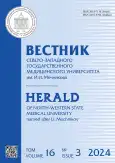Клиническая значимость модифицированной классификации острого дивертикулита по Hinchey
- Авторы: Карпухин О.Ю.1,2, Шакиров Р.Р.1,2, Шакуров А.Ф.1,2, Панкратова Ю.С.1,2
-
Учреждения:
- Казанский государственный медицинский университет
- Республиканская клиническая больница Министерства здравоохранения Республики Татарстан
- Выпуск: Том 16, № 3 (2024)
- Страницы: 19-26
- Раздел: Оригинальные исследования
- URL: https://journal-vniispk.ru/vszgmu/article/view/271700
- DOI: https://doi.org/10.17816/mechnikov625952
- ID: 271700
Цитировать
Аннотация
Обоснование. В последние десятилетия отмечен повсеместный рост заболеваемости дивертикулярной болезнью более чем в 10 раз и частоты ее осложнений в диапазоне от 5 до 25 %.
Цель — представить клинический опыт имплементации классификации острого дивертикулита по E.J. Hinchey (1978) в модификации A.M. Kaiser (2005).
Материалы и методы. Рассмотрена структура госпитализаций 314 пациентов с осложненным дивертикулитом, разделенных согласно классификации Hinchey на 6 групп в зависимости от возникших осложнений.
Результаты. Данная классификация позволяет не только стадировать заболевание в зависимости от степени тяжести возникших осложнений, но и верифицировать их результатами рентгеновской компьютерной томографии. Приведены современные методы коррекции осложнений, примененные в Республиканской клинической больнице (Казань).
Заключение. Широкое использование классификации позволит терапевтам, хирургам, колопроктологам и врачам ургентной сети своевременно выбирать эффективную тактику лечения, прогнозировать динамику воспалительного процесса и управлять потоками пациентов с данной патологией.
Полный текст
Открыть статью на сайте журналаОб авторах
Олег Юрьевич Карпухин
Казанский государственный медицинский университет; Республиканская клиническая больница Министерства здравоохранения Республики Татарстан
Автор, ответственный за переписку.
Email: oleg_karpukhin@mail.ru
ORCID iD: 0000-0002-7479-4945
SPIN-код: 7272-8878
д-р мед. наук, профессор
Россия, Казань; КазаньРаис Рафисович Шакиров
Казанский государственный медицинский университет; Республиканская клиническая больница Министерства здравоохранения Республики Татарстан
Email: raiskazan2@mail.ru
ORCID iD: 0000-0001-8344-2696
SPIN-код: 2570-6193
MD
Россия, Казань; КазаньАйдар Фаритович Шакуров
Казанский государственный медицинский университет; Республиканская клиническая больница Министерства здравоохранения Республики Татарстан
Email: aydarsha@gmail.com
ORCID iD: 0000-0001-6617-8619
SPIN-код: 2788-8941
канд. мед. наук
Россия, Казань; КазаньЮлия Сергеевна Панкратова
Казанский государственный медицинский университет; Республиканская клиническая больница Министерства здравоохранения Республики Татарстан
Email: iuliiaps@gmail.com
ORCID iD: 0000-0001-7498-2412
SPIN-код: 1511-6583
канд. мед. наук
Россия, Казань; КазаньСписок литературы
- Cirocchi R., Popivanov G., Corsi A., et al. The trends of complicated acute colonic diverticulitis – a systematic review of the national administrative databases // Medicina (Kaunas). 2019. Vol. 55, N 11. P. 744. doi: 10.3390/medicina55110744
- Rezapour M., Ali S., StollmanN. Diverticular disease: an update on pathogenesis and management // Gut Liver. 2018. Vol. 12, N 2. P. 125–132. doi: 10.5009/gnl16552
- Ардатская М.Д., Ачкасов С.И., Веселов В.В., и др. Дивертикулярная болезнь // Колопроктология. 2021. Т. 20, № 3. С. 10–27. EDN: XRCBQO doi: 10.33878/2073-7556-2021-20-3-10-27
- Резницкий П.А., Ярцев П.А. Современная диагностика и хирургическое лечение осложнений дивертикулита ободочной кишки // Журнал им. Н.В. Склифосовского Неотложная медицинская помощь. 2017. Т. 6, № 1. С. 41–50. EDN: YGUGDP doi: 10.23934/2223-9022-2017-6-1-41-50
- Тимербулатов В.М., Тимербулатов М.В., Мехдиев Д.И., и др.. Дивертикулярная болезнь ободочной кишки. Москва: Медицинская книга, 2016. 260 с.
- Klarenbeek B.R., de Korte N., vanderPeet D.L., Cuesta M.A. Review of current classifications for diverticular disease and a translation into clinical practice // Int J Colorectal Dis. 2012. Vol. 27, N 2. Р. 207–214. doi: 10.1007/s00384-011-1314-5
- Ambrosetti P., Jenny A., Becker C., et al. Acute left colonic diverticulitis – compared performance of computed tomography and water-soluble contrast enema: prospective evaluation of 420 patients // Dis Colon Rectum. 2000. Vol. 43. Р. 1363–1367. doi: 10.1007/bf02236631
- Карпухин О.Ю., Юсупова А.Ф., Панкратова Ю.С., и др. Компьютерная томография в диагностике и лечении воспалительных осложнений дивертикулярной болезни ободочной кишки // Колопроктология. 2021. Т. 20, № 4. С. 34–41. EDN: LYJIRL doi: 10.33878/2073-7556-2021-20-4-34-41
- Hinchey E.J., Schaal P.G., Richards G.K. Treatment of perforated diverticular disease of the colon // Adv Surg. 1978. Vol. 12. P. 85–109.
- Kaiser A.M., Jiang J.K., Lake J.P., et al. The management of complicated diverticulitis and the role of computed tomography // Am J Gastroenterol. 2005. Vol. 100. Р. 910–917. doi: 10.1111/j.1572-0241.2005.41154.x
- Левчук А.Л., Абдуллаев А.Э. Радикальные хирургические вмешательства после миниинвазивных санирующих операций по поводу осложненного дивертикулита толстой кишки // Вестник Национального медико-хирургического центра им. Н.И. Пирогова. 2023. Т. 18, № 3. С. 71–79. EDN: CUOGXU doi: 10.25881/20728255_2023_18_3_71
- Constantinides V.A., Tekkis P.P., Athanasiou T., et al. Primary resection with anastomosis versus Hartmann’s procedure in non elective surgery for acute colonic diverticulitis: a systematic review // Dis Colon Rectum. 2006. Vol. 49, N 7. Р. 966–998. doi: 10.1007/s10350-006-0547-9
- Almy T.P., Howell D.A. Medical progress. Diverticular disease of the colon // N Engl J Med. 1980. Vol. 302, N 6. Р. 324–331. doi: 10.1056/NEJM198002073020605
- Werner A., Diehl S.J., Farag-Soliman M., Duber C. Multi-slice spiral CT in routine diagnosis of suspected acute left-sided colonic diverticulitis: a prospective study of 120 patients // Eur Radiol. 2003. Vol. 13. P. 2596–2603. doi: 10.1007/s00330-003-1887-7
- Minordi L.M., Larosa L., Berte G., et al. CT of the acute colonic diverticulitis: a pictorial essay // Diagn Interv Radiol. 2020. Vol. 26, N. 6. P. 546–551. doi: 10.5152/dir.2020.19645
- Lameris W., van Randen A., Bipat S., et al. Graded compression ultrasonography and computed tomography in acute colonic diverticulitis: meta-analysis of test accuracy // Eur Radiol. 2008. Vol. 18, N 11. P. 2498–2511. doi: 10.1007/s00330-008-1018-6
- Sartelli M., Moore F.A., Ansaloni L., et al. A proposal for a CT driven classification of left colon acute diverticulitis // World J Emerg Surg. 2015. Vol. 10. P. 3. doi: 10.1186/1749-7922-10-3
- Драпкина О.М., Лазебник Л.Б., Бакулин И.Г., и др. Дивертикулярная болезнь толстой кишки: клиническая картина, диагностика, лечение и профилактика // Экспериментальная и клиническая гастроэнтерология. 2023. Т. 2. С. 33–69. EDN: CDSXWZ doi: 10.31146/1682-8658-ecg-210-2-33-69
Дополнительные файлы












